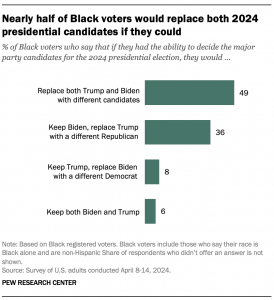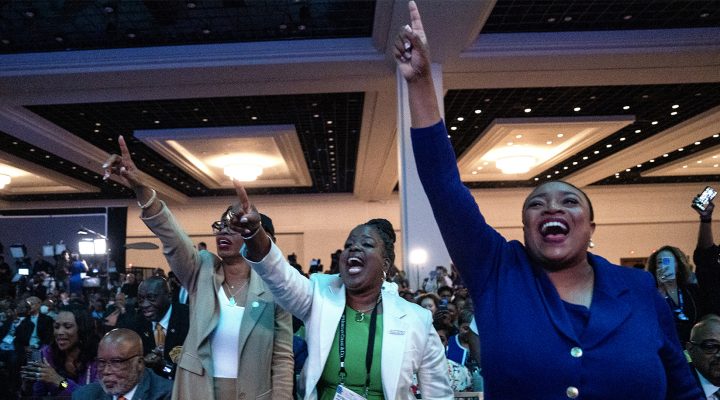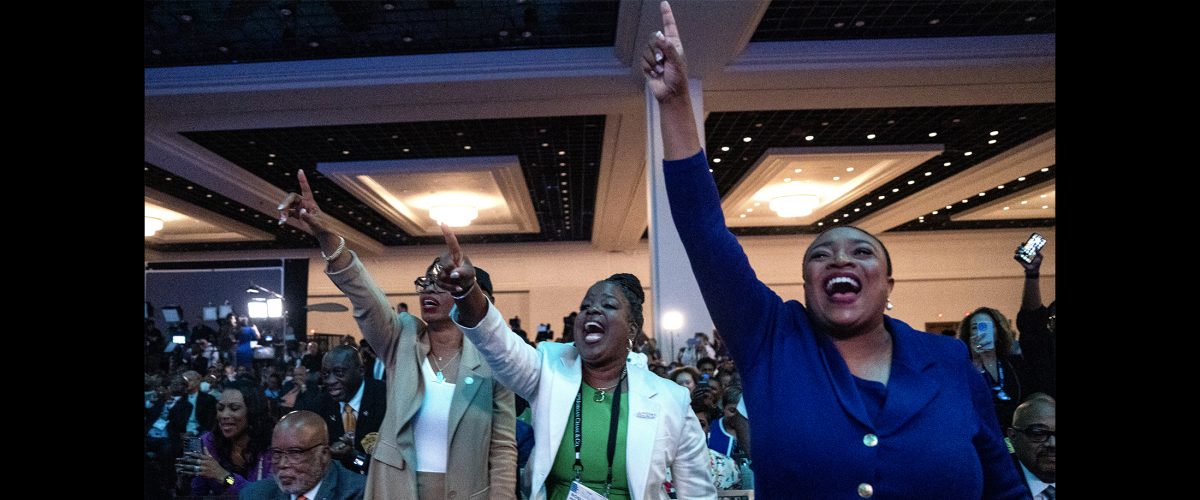Before bowing to public pressure to quit the November presidential race, President Joe Biden was a favorite of many people within the Black voting community.
While nationally the president was reported to trail his Republican rival, Donald Trump, in some nationwide polls, he held a commanding lead over his rival among Black American voters.
Multiple polls showed Biden to be the preferred candidate of a majority of potential Black voters. One such poll came from Pew Research Center: “Today, American voters are about evenly split between the two major political coalitions, both in their partisan identification and in their presidential vote preference. But Black voters remain largely aligned with the Democratic Party (83% identify with or lean to the Democrats), and 77% of Black registered voters say they would prefer to vote for Biden over Trump in the 2024 presidential election.”
 Despite that preference, “about half of Black voters (49%) say they would replace both Biden and Trump with different candidates if they had the ability to decide,” the report says. “This is similar to the share of all voters who say this.”
Despite that preference, “about half of Black voters (49%) say they would replace both Biden and Trump with different candidates if they had the ability to decide,” the report says. “This is similar to the share of all voters who say this.”
One half of that chance now has presented itself with Biden announcing July 21 he will not accept his party’s nomination for office a second term. Although the Democratic National Convention is still a month away, Biden had secured enough primary votes to ensure his nomination.
In opting out, Biden threw his support behind Vice President Kamala Harris who, if elected, would become the nation’s first female president, first Black president and first Asian president. Her family heritage is mixed.
“My very first decision as the party nominee in 2020 was to pick Kamala Harris as my vice president,” Biden said. “And it’s been the best decision I’ve made. Today I want to offer my full support and endorsement for Kamala to be the nominee of our party this year. Democrats — it’s time to come together and beat Trump. Let’s do this,” he said via his X account.
Biden’s advocacy for Harris is not new. Just a few days ago, he said the same at the 115th convention organized by the National Association for the Advancement of Colored People, the civic rights organization created in 1909.
“It’s because of you that I’m president and Kamala Harris is vice president,” he told the NAACP. “By the way, she’s not only a great vice president. She can be president of the United States.”
Now that Harris appears likely to take the top of the Democratic ticket, she thanked Biden and promised to do all in her power to defeat Trump.
“I am honored to have the president’s endorsement and my intention is to earn and win this nomination,” she said.
What she will need next is the endorsement of organizations like the NAACP.
 In a recent interview with CBS, NAACP President Derrick Johnson said Biden’s administration has done a good job of implementing his group’s Black America Policy Recommendations — which included policies related to racial equality, economic empowerment, education, the criminal justice system, health and well-being. When asked about a perceived softening of support for Biden or the Democratic Party in some polls, Johnson replied that he hadn’t seen polls suggesting so and added that on the contrary, NAACP surveys point to a growing strengthening of support for candidates who care about equal protection under the law, the protection of democracy and policies that focus on all citizens and not just some citizens.
In a recent interview with CBS, NAACP President Derrick Johnson said Biden’s administration has done a good job of implementing his group’s Black America Policy Recommendations — which included policies related to racial equality, economic empowerment, education, the criminal justice system, health and well-being. When asked about a perceived softening of support for Biden or the Democratic Party in some polls, Johnson replied that he hadn’t seen polls suggesting so and added that on the contrary, NAACP surveys point to a growing strengthening of support for candidates who care about equal protection under the law, the protection of democracy and policies that focus on all citizens and not just some citizens.
While maintaining that NAACP is nonpartisan, Johnson said the Black vote made a difference in 2020 and he was proud to welcome Biden to the event. He called Biden a leader who doesn’t shut the door in the face of Black people but turns up the volume when speaking, a leader who may not always get it right “but is all in on getting it done.”
Taking the stage, Biden described himself as a lifetime member of NAACP and said he’s “all in” on the causes the NAACP champions.
Now that he has thrown his weight behind Harris, a Black woman, it seems likely the allegiance given Biden would transfer.
“With the help of the NAACP, Black elected members in Congress, we’ve gotten so much done,” he told the group. “Presidential historians say we’ve gotten more done of consequence than any president since Franklin Roosevelt. Just think about what the Black community was when I came into office. Think about how far the Black community has come … with historic low Black unemployment.”
According to a recent Brookings Institution report by Michael Hais and Morley Winograd, “Party identification is a powerful predictor of voting behavior among all segments of the American electorate.”
Citing American National Election Studies data, Hais and Winograd said: “Since the mid-1960s, with only slight variation, about eight in 10 Black voters identified with or leaned toward the Democratic Party and around one in 10 have identified with or leaned toward the Republican Party. It should be of no surprise to anyone, then, that 92% of Blacks voted for Biden over Trump in 2020.”
The Washington Post recently reported: “It is true that current polling shows Trump faring better than he did with Black voters in 2020 and that the gap between his support and support for President Biden is far narrower than it was four years ago. But — as is the case with other apparent shifts since 2020 — that’s more a function of apathy about Biden than enthusiasm about Trump.”
Interpreting a USA Today poll published in June, swapping Biden for Harris at the top of the Democratic ticket could make a huge difference in enthusiasm among Black voters.
That poll showed Trump still deeply unpopular with Black voters, who said they would vote for Biden or third party candidates before casting a ballot for Trump: “Again and again, in this poll and others, the majority of Black voters say they may not be in love with Biden but, as Kevin Hill, 46, of Oakland, California, put it, ‘What’s the alternative? Trump?’”
Now there is a new alternative.


